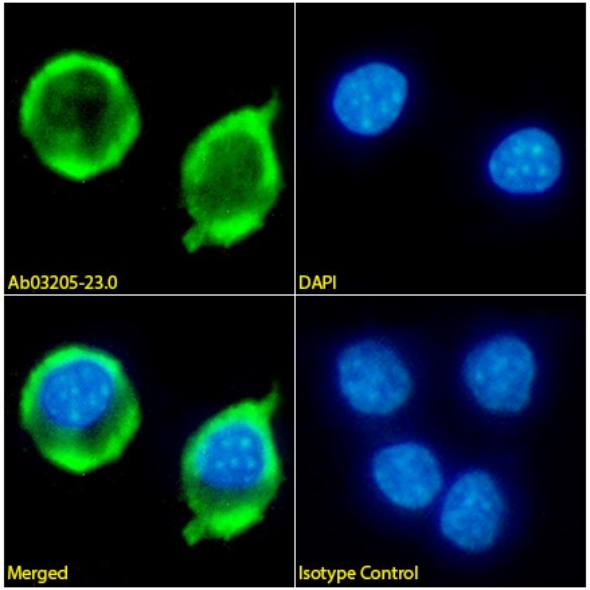Research-Grade Biosimilar Antibodies from Absolute Antibody
Bio-Connect is proud to announce that we supply the innovative research-grade biosimilar antibodies from Absolute Antibody (a Vector Labs company) in the Benelux region.
Absolute Antibody: Tumors develop from oncogene activation and tumor suppressors inactivation. Understanding and targeting these opposing forces is central to cancer biology, and antibodies are vital tools in this research.
Tumors develop from two changes in the human genome: activation of oncogenes and inactivation of tumor suppressors. Oncogenes confer a growth advantage to a cell, giving it a fast pass to proliferate. Tumor suppressors curb this uncontrolled growth and support cell balance. Understanding and targeting these opposing forces is central to cancer biology, and antibodies are indispensable tools in this research.
Tumor suppressors work through a variety of mechanisms, like controlling the cell cycle to curb unwanted cell proliferation and modulating DNA repair. Antibodies are highly specific tools to help elucidate the details of these mechanisms and reveal therapeutic targets for treating loss of function or altered function of tumor suppressor proteins.
Checkpoints are built into the cell cycle as safeguards against malfunctions, and proto-oncogenes code for proteins that can pass along proliferative signals to cells. Oncogenes can arise when proto-oncogenes are mutated and proteins that normally switch between on and off signaling are stuck in their activated state. Ras proteins, for example, can be mutated to be permanently active, leading to uncontrolled proliferation (Chow, 2010). Antibodies against Ras proteins like Kras (Ab03878) and p21Ras (Ab03876) can be used to develop targeted therapies and monitor oncogene expression.
Key tumor suppressors like p53, RB, and p16INK4a regulate cell cycle checkpoints, preventing damaged cells from dividing. For example, p53, a transcription factor, can halt the cell cycle at G1/S and G2/M checkpoints in response to DNA damage (Senturk and Manfredi, 2016). If the damage is beyond repair, p53 can induce apoptosis, a form of programmed cell death that eliminates potentially cancerous cells (Aubrey et al., 2017). To localize and quantify p53 proteins and P53 gene expression, recombinant anti-p53 antibodies (Ab00142) can be used in western blot, immunoprecipitation, and immunohistochemistry.
Retinoblastoma protein (RB) is another tumor suppressor and controls the transition from the G1 phase to the S phase of the cell cycle, acting as a brake that prevents cells from replicating their DNA before they are ready. By regulating this checkpoint, RB ensures that cells only proceed to DNA replication and division when they are fully prepared, thus preventing uncontrolled cell proliferation. To help visualize and measure RB levels, anti-RB antibodies and antibodies against RB associated proteins like RBBP5 (Ab01853) can be valuable research tools.
Tumor suppressors like p16INK4a (also known as p16) can also control cell cycles by putting cells into a state of senescence, where they permanently lose the ability to proliferate, especially helpful for putting a stop to the progression of cells that have potentially oncogenic mutations. An interesting detail to note is that cellular senescence can be triggered by chemotherapy and that senescence can make chemotherapy less effective (Demaria et al., 2017). More studies with tools like anti-p16 antibodies (Ab03149) are needed to better understand the interplay between tumor suppressors, senescence, and cancer therapies.
DNA is constantly exposed to damaging agents and replication errors are inevitable. Tumor suppressor proteins play a crucial role in detecting DNA damage and orchestrating its repair to preserve genomic stability. For example, tumor suppressor proteins BRCA1 and BRCA2 are essential components of the homologous recombination repair pathway, a high-fidelity mechanism for repairing double-strand DNA breaks. Another tumor suppressor protein, E-cadherin, is associated with nucleotide excision repair, which removes bulky DNA lesions like those caused by UV radiation. Loss of function in these tumor suppressors leads to mutation accumulation and cancer development. Antibodies against BRCA proteins (LS-F15446) and E-cadherin (Ab03203) are essential for studying DNA damage response and uncovering vulnerabilities in tumor cells.
DNA repair in cancer cells can be exploited using targeted therapies in tandem with antibodies against oncogene products. For example, Lee et al. (2024) found that therapy targeting the oncogene product HER2 using the antibody-drug conjugate (ADC) trastuzumab deruxtecan (T-DXd) in patients with HER2-overexpressing metastatic breast cancer in tandem with DNA repair-targeting drugs like elimusertib resulted in high breast cancer cell death in vitro. This suggests that combination treatment of oncogene products with ADCs and DNA repair drugs may be a promising therapeutic avenue. Our recombinant research grade biosimilar antibodies for biologics like trastuzumab (Ab00103) allow researchers better access to the tools they need to explore better cancer treatments.

To better explore the impacts of tumor suppressors and oncogenes on cancer progression, we offer researchers a suite of recombinant engineered antibodies. Our collection of recombinant antibodies supports tumor suppressor and oncogene research with:
The flexibility and specificity of recombinant engineered antibodies open experimental possibilities to explore the function and targeting of tumor suppressors and oncogenes in a reproducible way, adding to our understanding of how cancers develop and potential therapeutic avenues.
We gladly support you by keeping you updated on our latest products and the developments around our services.